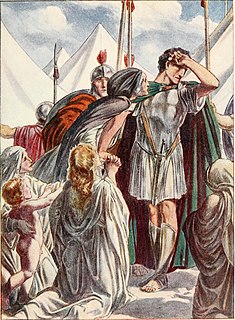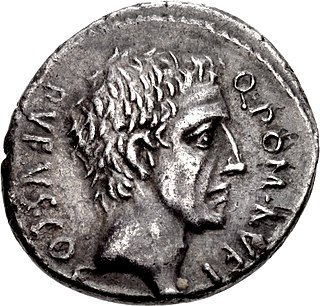Related Research Articles
Gnaeus Octavius was a Roman senator who was elected consul of the Roman Republic in 87 BC alongside Lucius Cornelius Cinna. He died during the chaos that accompanied the capture of Rome by Cinna and Gaius Marius.
Quintus Caecilius Metellus Pius was a Roman politician and general. Like the other members of the influential Caecilii Metelli family, he was a leader of the Optimates, the conservative faction opposed to the Populares during the last century of the Roman Republic.

Lucius Minucius Esquilinus Augurinus was a Roman politician in the 5th century BC, consul in 458 BC, and decemvir in 450 BC.

The gens Marcia, occasionally written Martia, was one of the oldest and noblest houses at ancient Rome. They claimed descent from the second and fourth Roman Kings, and the first of the Marcii appearing in the history of the Republic would seem to have been patrician; but all of the families of the Marcii known in the later Republic were plebeian. The first to obtain the consulship was Gaius Marcius Rutilus in 357 BC, only a few years after the passage of the lex Licinia Sextia opened this office to the plebeians.
Gnaeus Cornelius Lentulus Clodianus was a Roman politician and general who was one of two Consuls of the Republic in 72 BC along with Lucius Gellius. Closely linked to the family of Pompey, he is noted for being one of the consular generals who led Roman legions against the slave armies of Spartacus in the Third Servile War.
Lucius Julius Caesar was a Roman politician and senator who was elected consul of the Roman Republic in 64 BC. A supporter of his cousin, the Roman dictator Gaius Julius Caesar, Lucius was a key member of the senatorial coalition which strove to avoid civil war between the Roman Senate and his nephew Marcus Antonius in the aftermath of Caesar's assassination in 44.

Gaius Porcius Cato was a Roman politician and general, notably consul in 114 BC. He was the son of Marcus Porcius Cato Licinianus and grandson of Cato the Censor.
Lucius Volcatius Tullus was a Roman politician who became consul in 66 BC alongside Manius Aemilius Lepidus.

Publius Cornelius Scipio Nasica Corculum was a politician of the Roman Republic. Born into the illustrious family of the Cornelii Scipiones, he was one of the most important Roman statesmen of the second century BC, being consul two times in 162 and 155 BC, censor in 159 BC, pontifex maximus in 150 BC, and finally princeps senatus in 147 BC.
Mamercus Aemilius Lepidus Livianus was a Roman politician and military commander who was consul in 77 BC.

The gens Minucia was an ancient Roman family, which flourished from the earliest days of the Republic until imperial times. The gens was apparently of patrician origin, but was better known by its plebeian branches. The first of the Minucii to hold the consulship was Marcus Minucius Augurinus, elected consul in 497 BC.

Lucius Marcius Philippus was a Roman politician who was elected suffect consul in 38 BC. He was step-brother to the future emperor Augustus.

Quintus Pompeius Rufus was a consul of the Roman Republic in 88 BC. His colleague in office was the future dictator Sulla.
Gaius Fannius was a Roman republican politician who was elected consul in 122 BC, and was one of the principal opponents of Gaius Gracchus. He was a member of the Scipionic Circle.
Vopiscus Julius Iullus was a Roman statesman, who held the consulship in 473 BC, a year in which the authority of the Roman magistrates was threatened after the murder of a tribune of the plebs.
Gaius Julius Iulus was a member of the Roman gens Julia, and was nominated dictator in 352 BC.
Publius Pinarius Mamercinus Rufus was a Roman senator who held the consulship alongside Gaius Julius Iulus in 489 BC.
Titus Manlius Torquatus was a politician of the Roman Republic, who became consul in 165 BC. Born into a prominent family, he sought to emulate the legendary severity of his ancestors, notably by forcing his son to commit suicide after he had been accused of corruption. Titus had a long career and was a respected jurist. He was also active in diplomatic affairs; he notably served as ambassador to Egypt in 162 BC in a mission to support the claims of Ptolemy VIII Physcon over Cyprus.

Aulus Manlius Torquatus Atticus was a politician during the Roman Republic. Born into the prominent patrician family of the Manlii Torquati, he had a distinguished career, becoming censor in 247 BC, then twice consul in 244 and 241 BC, and possibly princeps senatus in 220 BC. Despite these prestigious magistracies, little is known about his life. He was a commander who served during the First Punic War, and might have pushed for the continuation of the war even after Carthage had sued for peace following the Roman victory at the Aegate Islands in 241 BC. The same year, he suppressed the revolt of the Faliscans in central Italy, for which he was awarded a triumph. At this occasion, he may have introduced the cult of Juno Curitis at Rome.
Lucius Papirius Crassus was a consul of the Roman republic in 436 BC and possibly a censor in 430 BC.